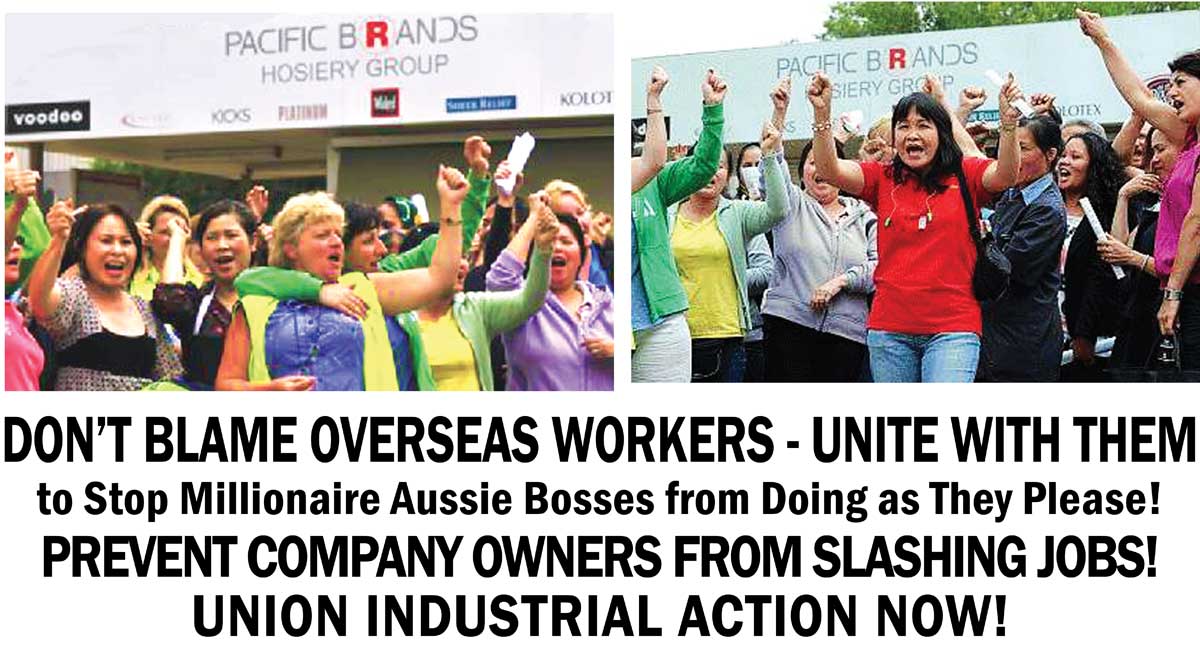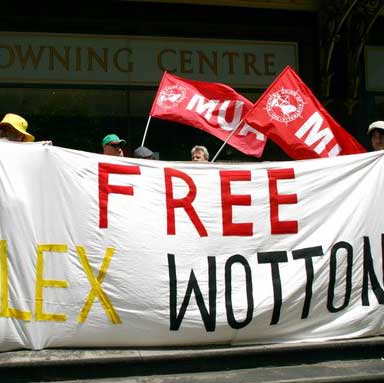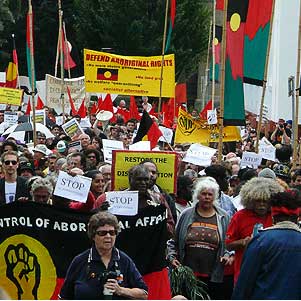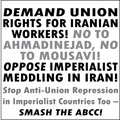-
RALLYING TOGETHER A SOCIETY-WIDE MOVEMENT TO STOP JOB CUTS
In those smaller workplaces where union strength is weaker, employees have less capacity to spearhead industrial action against job cuts on their own. But it is still necessary to stop job losses in these workplaces. And it is important to be able to harness the energy of these workers in the broader struggle to defend workers jobs. Therefore, a set of demands must be raised that can rally together workers from both big and small workplaces alongside all the various natural allies of workers (including the unemployed, poor pensioners and pro-working class students) in the fight to preserve jobs. Around these demands, united front demonstrations and stopworks can be organized in the same spirit as the struggle that workers waged from the mid-19th to the early 20th century to win the 8 hour work day. The exact demands will come out of the struggle but they could include:
- That no enterprise can sack workers if it is currently making a profit.
- That no company can lay off workers if the company’s total profit over the previous, say, two years exceeds the annual wage bill of all the potentially laid off workers.
- No firm can cut jobs if any of its executives are on a total salary/bonus package that exceeds, say, $300,000 a year.
- All company correspondence, meeting minutes and financial records must be open for inspection by unions (this is to stop company owners from crying poor when they want to sack workers.)
If the movement in support of such pro-jobs, anti-profit demands get strong enough to win codification in laws then workers will need to make absolutely sure that any legislation is very specific. For any laws that simply give the government more discretionary powers will end up just giving the capitalist state more legal covering to attack the working class when it feels able to. For example, if something like a “Workers Job Preservation Authority” is created, that body instead of curbing the bosses would be used to decree wage cuts for workers or a crackdown on industrial action. It is worth remembering that the ACCC (Australian Competition and Consumer Commission) which is meant to stop the formation of monopolies and curb rip off pricing by businesses, infamously became a weapon against the MUA union during the 1998 waterfront struggle.

A wave of general strikes against rising living costs and racist discrimination brought economic activity to a standstill for several weeks this year on three French island colonies: Guadeloupe and Martinique in the Caribbean and Reunion in the Indian Ocean. Starting in Guadeloupe on Jan 20, a massive 65,000 people out of a total population of just 410,000 marched through its capital city, Pointe-a-Pitre, on Jan 30 (pictured.) On Martinique, trade unions launched a general strike on Feb 5. In Reunion workers went on general strike on March 5, a day after the 44-day long strike on Guadeloupe ended with the French capitalist state capitulating to all 20 of the united workers’ immediate demands.
UNIONS NEED A CONSISTENTLY ANTI-CAPITALIST LEADERSHIP
To lead the struggle against job slashing, workers need a trade union leadership that is prepared to challenge the “right” of company owners to boost profits by any means necessary. But our ACTU leaders have shown an, at best, ambiguous stance on this issue. In January ACTU President Sharan Burrow stated the willingness of unions to consider temporary wage freezes in order to try and save jobs during the recession. This is a long way from launching industrial action to force the corporate multimillionaires to both retain all employee positions and
themselves pay for the cost of doing so.
The current ACTU leadership is pro-ALP and shares the ALP’s notion that workers’ interests will be best served by working in partnership with the Australian capitalists. But the idea of a stable partnership between capitalists and workers is a myth. For the capitalist class’ interests are based on exploiting workers labour while workers’ interests lie in the exact opposite direction – in curbing this exploitation. The bosses talk of a partnership with workers only in order to make workers obediently toil away for them. But then they give away what they really think of this “partnership” in the way that they callously lay off workers whenever that is good for profits. Kenworth Trucks bosses displayed their notion of “partnership” when they infamously waited until two days before last Christmas to announce which 35 workers at their Melbourne manufacturing plant were being axed.
Similarly, Labor governments talk of a partnership between workers and business owners but the truth is that ALP governments cannot but administer the existing capitalist state for the exclusive interests of the capitalists. Today, the Rudd government seeks populist appeal by proposing that executive pay be more tightly controlled by shareholders and by speaking of the need for corporate social responsibility. Yet the government has done nothing to put actual restrictions on the ability of company owners, that is the shareholders, to slash their workforce. Instead, after having ridden upon the wave of opposition to Workchoices, Rudd and Gillard are introducing an Industrial Relations package that retains significant components of Workchoices. Dubbed by left-wing unionists as Workchoices Lite, the “new” laws contain most of Workchoices restrictions on the right to strike – restrictions, that is, on the type of action that workers need to stop job cuts.
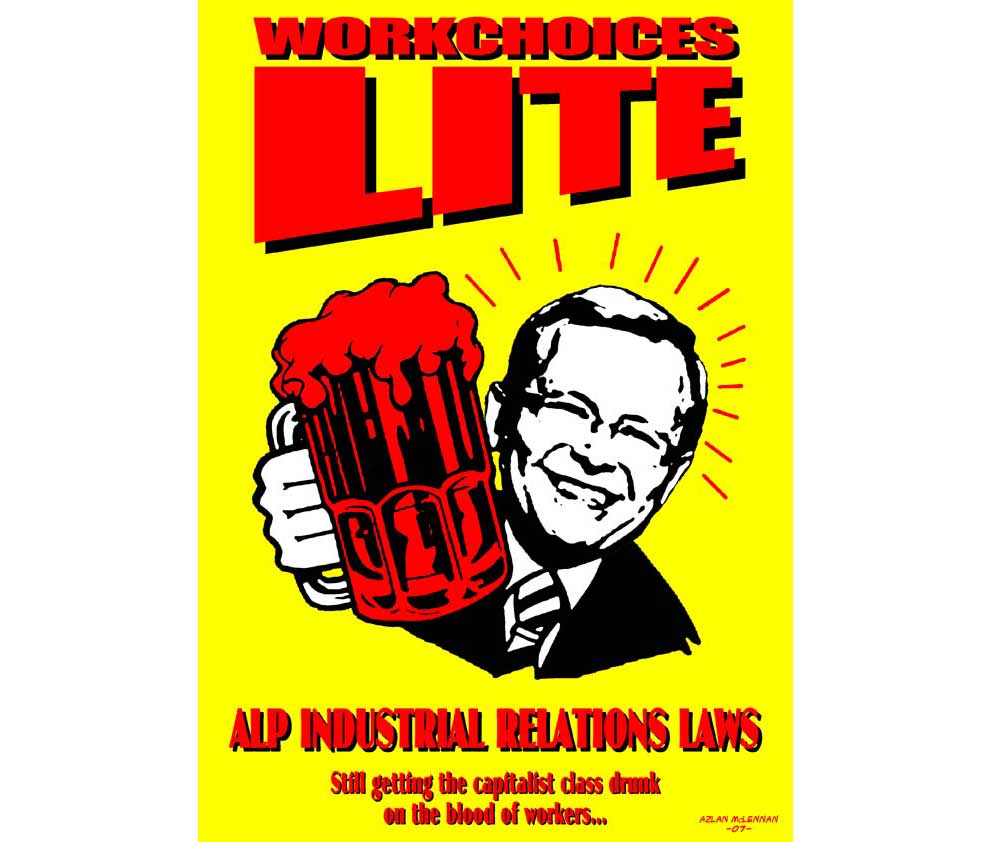
A Melbourne artist Megat Azlan bin Iskandar McLennan’s satirical take on the ALP leadership’s labour law reforms.
Instead of the illusion of “collaboration” with the corporate big wigs and their government, our unions must operate on the understanding that the working class has no genuine interest in ensuring good profits for the bosses. Only such an outlook can properly prepare the working class to beat back the capitalists when the capitalists scream that their “system depends on profits.” In reality, of course, their system depends upon the exploitation of workers’ labour. But you can bet your bottom dollar that if the workers movement succeeds in forcing some company owners to retain jobs at the cost to their bottom line then the entire capitalist class will scream. They will point out that without the prospect of high profits, investors will be deterred from investing in new factories and infrastructure. They will actually be right … but only if one accepts the framework of capitalism. That is why we should be clear from the outset that stopping bosses from cutting jobs offers just a temporary and partial solution to the unemployment crisis. Victories in the urgent struggle to defeat job cuts should thus be seen as a first step, a step that will give the working class the confidence and authority it needs to make further gains in the struggle against the exploiting class. The next step becomes posed when the corporate owners slash investment in response to the lower profits that result from having a larger workforce than they had wanted. Then the workers’ movement should respond by calling for the divesting enterprises to be ripped from the hands of their greedy owners and placed in the ownership of all the people. But for such nationalizations to truly place the enterprises in the hands of the masses, the state holding the nationalized property has to itself be turned into a state that is actually in the hands of the masses. We Leninists contend that such a state can only be built by demolishing the old capitalist structures and constructing from scratch a new workers’ state.
THE HARM DONE TO THE WORKERS' CAUSE BY SQUABBLING WITH OVERSEAS WORKERS OVER SCARCE JOBS
The main planks that are needed to build class struggle against job cuts are strong trade union organization and workers’ unity. Unfortunately, however, workers unity across national boundaries is today under major threat. This was seen most clearly following Pacific Brands’ recent announcement of job cuts. Initially, workers responded with 100% justified anger against the greed of the Pacific Brands bosses and demanded their jobs back. But quickly the mood was influenced by the nationalist politics of the current union leadership and by the mainstream media’s drive to divert the whole issue into an Australia versus Asia battle. As a result the campaign became focussed on Pacific Brands’ plan to outsource from Asia some of the products it would stop making here. So instead of the issue being one of stopping workers from losing their jobs
full stop the question became posed as one of stopping Australian jobs going to Asia. The matter had been harmfully diverted into an Australian workers vs Asian workers issue. This was reflected in the direction of the industrial action that has been organised. The Rail, Bus and Tram Union, the Transport Workers Union and the Maritime Union of Australia jointly announced that they would blockade any shipment
overseas of Pacific Brands factory equipment. Now, industrial action that demands that the Pacific Brands workers get their jobs back is indeed what is desperately necessary. But the current union blockade seems to only challenge the sackings
if the jobs go overseas.
Our aim should be to save the Pacific Brands workers’ jobs … full stop! We don’t care whether the greedy company owners want to retrench workers to set up overseas or to move to set up within Australia or to simply close down plants – our aim must solely be to prevent them from slashing workers’ jobs. Therefore, the blockade of factory equipment should be moved from Australia’s boundaries and placed right outside the Pacific Brands factory gates. The company should be prevented from moving the factory gear anywhere - whether within Australia or overseas. That would make it clear to the corporate millionaires that they must reinstate the sacked workers or else they will lose those factory assets. Given the widespread anger of working class people at the Pacific Brands bosses, a union call for picket lines outside the company gates would win widespread support. This could then develop into a sit-in inside the closed plants by the sacked workers and thousands of their supporters. Already, all across the world workers are beginning to take such inspiringly militant industrial action in the face of the threat of job cuts:
Sit-ins are already becoming more common. In December workers occupied a window factory in Chicago for five days to secure severance pay that they were owed. In February workers from Waterford Wedgwood in Ireland marched on the offices of Deloitte, an accountancy firm, and refused to leave until they got a meeting with the company’s receiver. In America, says Gary Chaison, professor of industrial relations at Clark University in Massachusetts, workers are likely to become more militant, because of a sense of injustice over pay. “I could easily see executive hostage-taking happening here within a few months,” he says.”
- The Economist, March 19, 2009
Mainland France’s capitalists were rocked by a general strike and demonstrations of as many as 3 million people across the country on March 19, following a similar day of protest and industrial action on Jan 29. Many placards, posters and stickers emphasised the need to follow the successes in the French West Indies where workers stuck to their guns for many weeks on end. “For us the example to follow is what happened in Guadeloupe and Martinique,” one French leftist leader observed. “We are fighting now for a continuous general strike.”
In France, in fact, industrial hostage-taking has already proven to be a rather successful tactic. On March 12, factory workers seeking better severance terms shut the French head of Sony in a meeting room, barricading the plant with huge tree trunks. Rather than the cops being sent in to smash the workers’ struggle, the local governor joined the boss in further talks with the workers who only released the unfortunate executive after successfully negotiating a better redundancy deal with him. Earlier, in February last year, French workers had seized the head of a car-parts factory after learning of his plans to close the plant and, ten days later, Michelin tyre factory workers locked in two senior executives in protest at plans to shut their plant (The Economist, March 19 2009.) Such militancy when combined with a clear direction will prove that, in the end, workers united shall never be defeated!
The current Pacific Brands blockade is, however, so misdirected that the blockade is being supported by, none other than The Daily Telegraph. No joke! The Daily Telegraph Editorial of 28 February concluded with a call to “Bring on the Blockade.” This newspaper is owned by the right-wing Murdoch family and is notorious for whipping up hostility to unions. Indeed the “Bring on the Blockade” editorial admits that: “We [i.e. The Daily Telegraph] have been resolute, for example, in standing against union tactics that unfairly inconvenience commuters or students.” That such a mouthpiece of the exploiting class would now support this particular union blockade should make thinking unionists consider whether the action itself is really directed in a way that can truly meet workers’ interests.
What Murdoch’s hacks like about the current blockade is precisely the fact that it cuts off solidarity between Australian workers and workers in Asia. Furthermore, they know that the nationalist logic of the blockade will inevitably divert the focus of hostility away from the greed of “our Aussie companies” and on to foreign producers. To encourage this diversion, The Daily Telegraph has followed up in the weeks since this editorial with a series of articles calling governments to buy only from Australian clothing companies. One front-page article (13 March) titled “Made In China” particularly fanned the flames of xenophobia. The piece slammed the NSW government for “creating thousands of jobs in China at the expense of Sydney workers” because it awarded government contracts for certain products – including ambulance uniforms and nurses’ outfits – to Chinese manufacturers. The article dubbed Nathan Rees as the “Premier for workers in China.” Unfortunately, many of our union officials including even the most staunch ones have been singing a similar tune as the tycoon-owned Daily Telegraph. The Fire Brigades Employees Union (FBEU) leadership, for example, has demanded that their uniforms be made by Australian manufacturers. Left-wing FBEU secretary Simon Flynn stated that “it is more important than ever that we keep pressure on to maintain the Australian content in all our members’ uniforms.”
Such protectionist demands do not in the end save any local jobs. For if the Australian workers movement can make demands to “stop local jobs being exported overseas” that is only going to encourage overseas unions to make similar demands - demands that would mean keeping out Australian-made goods. Korean unions could, for example, demand higher tariffs to stop Holden from exporting its new Veritas six-cylinder sedan to Korea, saying that the car “should be manufactured by Korean workers.” Chinese workers for their part could call to stop Holden from exporting to Shanghai its Global V6 engine claiming that since the engine is being imported from Australia, “Australian workers are taking Chinese workers’ jobs.” In the end, when you assemble all the competing protectionist claims together, the demands cancel each other out and no workers in any country end up being better protected.
More critically, the conflicting protectionist claims are harmful to the struggle to build industrial action against job cuts. Why? There are three major reasons. Firstly, because protectionism is based on the premise that supporting the local firms is good for local workers, it undermines workers’ understanding that the local company owners are actually the main enemy in the fight to defeat job cuts. Workers become lulled into thinking that they are on the same boat as the corporate bigwigs. This makes them unprepared to take the necessary action to pin the job slashing bosses to the rails which alone can stop these profiteers from executing their ruthless plans to throw many workers overboard.
Secondly, and most importantly, when workers in different countries are demanding that jobs go to workers in their own countries as opposed to workers abroad this is obviously divisive to the international workers movement. It greatly diminishes the chance that Australian workers facing job cuts would win solidarity from overseas workers. Especially in this globalised world such solidarity action - like secondary boycotts and solidarity strikes against the overseas interests of particular Australian corporations – can be crucial to victory. If Australian unions did make clear that our struggle has nothing to do with competing for jobs with overseas workers but is purely about stopping bosses from sacking workers then overseas workers who are themselves angry about the job cuts that they face would be eager to join with Australian workers in dealing blows to job-slashing corporations.
Let us not forget that in this “Great Recession” capitalist firms in every country that they operate in are slashing jobs. American-owned General Motors has announced that 47,000 of its employees worldwide will be sacked. Although some Australian-based firms like Pacific Brands are to move certain operations abroad, most Australian redundancies are not connected with jobs being moved overseas but are a result of company owners simply extinguishing job positions. The 3,400 jobs that BHP is axing in Australia are not going overseas – BHP is, in fact, wiping out another 2,600 workers abroad. Lend Lease is also not exporting the 400 jobs it is terminating here – the Australian property developer is planning to exterminate a further 1600 workers’ jobs overseas. Even when local firms do move some operations to poorer countries, the ultimate reason for the job losses is not “cheap overseas labour” but rather the obscene greed of the Australian capitalists. Take, for instance, Pacific Brands again. Today that company is crying poor to justify its jobs massacre. But last year that company’s owners made, even after paying the fat executive salaries, over $116 million profit. Do the maths and you will see that this profit is equal to $62,700 per worker that they are sacking. In other words, even if the 1850 workers slated to be laid off produced zero added value for the company, the owners could more than pay all their annual wages out of last year’s profits.
THE WORKERS MOVEMENT MUST FIGHT AGAINST RACISM
The third reason why protectionist demands harm the fight to stop job slashing is that it causes divisions between local workers from different backgrounds. When workers in Asia are seen as competitors for jobs then Chinese, Indian, Filipino and other residents of Asian origin here get targeted “It’s the people in your country that are taking our Aussie jobs,” soon becomes the bigot’s cry. That is why Pacific Brands factory workers in Sydney and Melbourne must have mixed feelings about the protectionist sentiment that is surrounding their retrenchment. Notwithstanding the media’s wish to portray Pacific Brands workers as universally true blue White Aussie battlers, most of these process workers are in fact women of Chinese, Vietnamese, Indian, Turkish, South American and other non-Anglo backgrounds. On the one hand many of these workers would accept their union leadership’s line that the “Aussie jobs should not be exported to Asia” campaign will help them save their jobs. Certainly, if they challenged this line they fear they would face stigmatisation as being unpatriotic, as having “not yet fitted into the Aussie way of life.” But, secretly, many of them would be concerned about what the social atmosphere created by rivalry with overseas workers will bring. Will their children cop more racist bullying at school? Will it become harder for their brother, sister, parents and friends to be able to migrate here? Will it become even more unsafe for them to visit a Sydney beach?
Trotskyist Platform: PO Box 1101, Fairfield NSW 1860, Australia.
E-mail: trotskyistplatform@gmail.com
Phone (Australia): 0417 204 611
Phone (International):0061 417 204 611
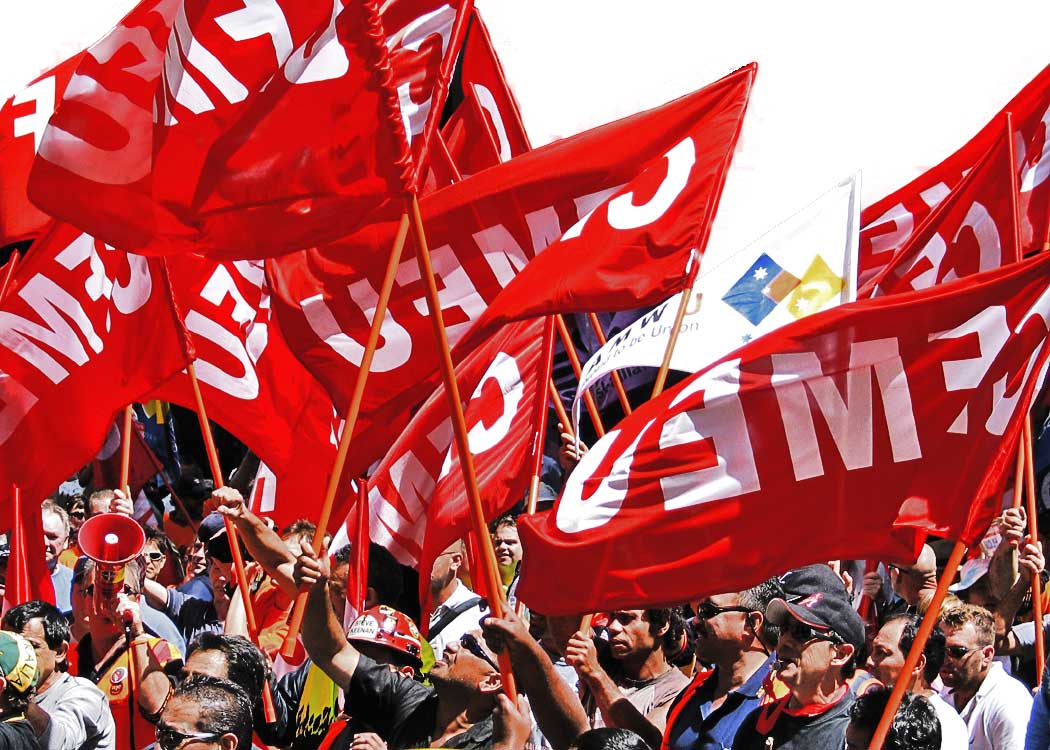
Already sections of the workers movement have gone from calling for stopping “overseas workers from being sent Australian jobs” to openly calling to reduce immigration from overseas. The Rudd/Gillard government has been only too willing to tacitly fuel such sentiments and divert blame for unemployment onto immigrants. On March 16, the Labor government announced a big cut to the skilled migration intake and with much fanfare emphasised that this measure is being taken to “protect local jobs.” Immigration Minister Chris Evans stated that “We don’t want people coming in who are going to compete with Australians for limited jobs’’ (Radio Australia News website, 16 March.) Such proclamations must be music to the ears of right-wing racists who smell a chance to seize on people’s fears. Already on “Australia Day” hundreds of racist youths draped in Australian flags and chanting “if you’re white, clap your hands” attacked Asian beachgoers on Manly Beach. At least one young Asian woman had to be taken away in an ambulance as a result of the racist violence which was an eerie echo of the 2005 Cronulla white supremacist riot.
Racism is not only frightening and disgusting it creates divisions amongst workers on the shop floor. And we know too well how slimy bosses are expert at manipulating any divisions they see among their workforce. Divided workers are much less capable of standing up to the bosses and uniting to fight against job cuts. That is why the union movement must take a rock hard stand against racism in society. When there is prior knowledge that violent white supremacists are planning an action they must be stopped by mass contingents of trade unionists, “ethnic” people and anti-racists of all colours. Similar union-centred forces must be mobilized to ensure that every beach, every club and every other public area can be safely accessed by “ethnic” communities. The workers movement must also stand for every person who comes here, including guest workers, to be granted the full rights of a citizen. And it should oppose any new anti-immigration measure not promote it.
Any bigotry that diverts from the workers struggle against the exploiting class must be defeated. That is why the union movement must champion the cause of every scapegoated sector of society. It should raise demands supporting the needs of single mothers. And the working class must energetically support the struggle for liberation of this country’s brutally oppressed first peoples – the Aboriginal people.
AUSTRALIAN UNIONS: SUPPORT CHINA'S NEW PRO-WORKER LABOUR LAWS!
The mainstream media have sought to divert anger over job cuts into fear especially of China. The big business-owned media’s hostility to China reflects the elite’s hatred of communist-ruled states. The Murdoch and Fairfax family-owned press portrays China as a nation of robotic workers slaving away for next-to-nothing and sucking away every other country’s industry. This is a depiction full of lies that is designed to appeal to prejudiced “yellow peril” fears of big Asian countries.
So what are things really like in China? Well, Chinese workers do indeed have lower wages than Australian workers but have much better wages than their counterparts in capitalist countries like India and Bangladesh. Unlike Australia which is spectacularly rich in natural resources per head of its population, China is resource poor per head of its own gigantic population. Let us not forget too that while Australian corporations like BHP and Woodside gain massive wealth by cruelly exploiting labour and natural resources in poorer countries, China was itself until 1949 a brutally subjugated neo-colony of Western powers. It was only after the 1949 communist-led revolution by tens of millions of China’s poor that her masses finally freed themselves from colonial domination. This 1949 revolution took the banks, key industries and all the agricultural land away from the capitalists and landlords and placed them into the collective ownership of the people. State ownership of China’s key sectors remains strong today. Workers in this socialistic state sector have more stable employment and much better working conditions than those that work in its private sector. It is through public ownership of the base economic sectors that China has been able to lift hundreds of millions of people out of the extreme poverty of the pre-1949 days, to build up its infrastructure and to make huge advances in public health care, education and women’s rights. There is a long way to go and China is still far away from being an affluent country. However, it is important to understand that Western corporations’ enthusiasm to invest in China does not only stem from the lower wages that invariably occur in a poorer country but because China, uniquely among relatively low-wage countries, is able to provide “First World” infrastructure and a well-educated workforce.
To be sure in China’s private sector - which is concentrated in clothing, footwear, toys and other consumer goods manufactured for export – workers are often terribly exploited. The enterprises involved are often owned by Western or Taiwanese bosses. But even here the greedy employers have no guarantee that they will be able to continue on this course because in China the capitalist class does not hold the political power. Notably, over the last few years not only have Chinese governments rapidly increased minimum wages but a massive and growing number of strikes, pickets and factory occupations have won workers significant pay rises. Simultaneously a union recruitment drive, supported by state media and communist politicians, has seen union numbers grow by over 70% in just 5 years. The rate of union membership of Chinese workers dwarfs that in Australia. However, Western-owned “multinational corporations” are trying all sorts of intimidatory tactics to retard the unionization drive.
At the start of last year, the Chinese government introduced a new Labour Law that heads in the opposite direction to Howard’s Workchoices and Rudd/Gillard’s Workchoices Lite. The Chinese law significantly increases employee rights. It encourages industry-wide collective bargaining and makes it illegal for an employer to ever make redundant a worker who at any time experienced a significant injury while employed in his firm. By retarding extreme exploitation by private bosses, the Labour Law also has the effect of protecting the socialistic state-owned enterprises from being unfairly undercut by sweatshop-style private firms.
In order to enact this Labour Law, Beijing had to face down some of the world’s biggest multinational corporations who through the American Chamber of Commerce in Shanghai actively campaigned against the legislation. The corporate big shots mostly failed in their efforts to weaken the labour legislation. But now they and their Chinese private sector counterparts are doing much to obstruct the implementation of the law.
Rather than getting misled into competing with their Chinese working class sisters and brothers, the Australian workers movement should help Chinese workers to fortify their gains and improve their wages and conditions. For example, workers here should support the Chinese government’s efforts to implement its pro-worker Labour Law. Australian unions ought to hit with bans and stopworks the Australian operations of multinational corporations that are known to be trying to sabotage the implementation of the Labour Law in China. Similar action could target firms impeding the trade union recruitment campaign in China. Most importantly the Australian working class needs to stand against those forces that, under the guise of “pluralism” and “democracy,” are seeking to ensure a “greater voice” in Chinese politics for private bosses and for the academics and economists that support them. If the capitalist class in China were to grab political power from the pro-communist forces then workers in the country’s private sector would be even more badly exploited and there would be catastrophic privatizations of the country’s big state-owned firms. Then the whole of the world’s most populous country would truly become a giant sweatshop for exploitation of labour. And that would radically drive down the conditions of workers the world over.
The Australian workers movement should not only solidarise with Chinese workers but should also learn from the society that the Chinese masses are building. For example, there are many provisions in China’s Labour Law that workers here do not enjoy. One such provision, Point 5 of Article 42 of the law, makes it illegal for an employer to ever lay off a longtime employee (defined as a person who has worked for the employer for at least 15 years) who is within 5 years of retirement, even for alleged incompetency and even if the company is undergoing financial difficulties. We need such a provision here too!
Most importantly, Australian workers ought to, as a positive example, look at the public ownership of key industries in China. As an example of what this social ownership of industry means let us do a comparison between Australia’s capitalist-owned Qantas and China Eastern Airlines which is one of three big majority state-owned carriers that dominate China’s aviation. Last financial year, Qantas made a whopping big profit of $969 million. Yet ever hungry for even more profits, the airline bosses announced last July that they would still be slashing 1,500 jobs. By contrast, China Eastern posted a nearly $500 million loss last year. But in response the Chinese state increased its majority stake in the company even further with a $1.47 billion share purchase and China’s big state–owned banks granted the airline huge loans on favourable terms. The airline announced that executive and management salaries would be cut by 10-30% but workers’ salaries would be unaffected. In complete contrast to Qantas, the China Eastern heads not only vowed that no employee would lose their job but stunningly announced that the company would hire a further 13,600 workers this year to meet expansion plans! Showing complete disinterest in the capitalist profit motive, General Manager Liu Shaoyong justified the plans by saying that the aviation industry plays a vital role in promoting employment and economic growth as well as improving people’s lives. We need the likes of Qantas, BHP and Pacific Brands to also be taken over into the hands of the people so that they too will operate according to the priorities that the China Eastern manager emphasised and not on the greedy profit motive that they run on now.
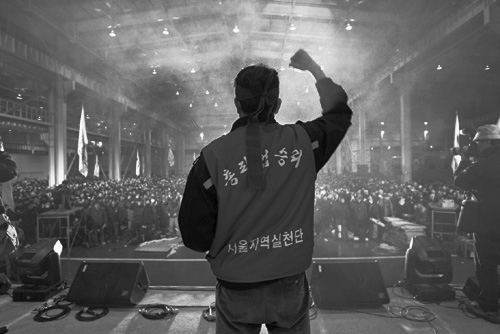
March, 2006: South Korean railway workers carry out a militant sit-in strike to demand increased hiring and to oppose casualisation of workforce. Strikers stood up to brutal attacks by police who imprisoned over 400 strikers.
Do Not Forget What Karl Marx Said!
Protectionism is an ideology that handicaps the workers movements in many countries. But it is especially strong in Australia. In part this is because land and mineral rich Australia is a relatively affluent country that is neighboured by hundreds and hundreds of millions of poorer people. This situation breeds fear among local workers that the bosses will seek to drive their conditions down to those of the country’s Northern and Eastern neighbours. But it also generates “First World” arrogance among more conservative Australian workers – a contemptible attitude that Australian workers “deserve” their better position because they are supposedly more practical and inherently more skilled than their counterparts in Asia and the Pacific. Such views blend in with White racist hostility to the region’s non-white peoples, racism that is painfully abundant in this society. It is worth noting that the ALP in its formative years was characterized by a program that called for high tariffs to keep out overseas made goods. Named the White Australia Policy, it sought to exclude Asians from immigrating to Australia and fostered the notion of “racial purity” to keep Aboriginal people subjugated with no rights at all in their own country. Interestingly, the newly federated Australia’s first two prime ministers, Edmund Barton and Alfred Deakin, were leaders of the Protectionist Party and were only able to form government at the time with the support of the fledgling ALP.
The presence of protectionism inside the Australian workers movement goes so deep that even avowedly internationalist components of the movement make protectionist demands. Take, for instance, the Communist Party of Australia (CPA) and its coverage of the job slashing by Pacific Brands. A CPA front-page article in the 4 March issue of their paper (The Guardian) powerfully exposes the greed of Pacific Brands. Yet the article concludes with protectionist calls for the government to halt tariff cuts and to consider import quotas. To be sure, as anti-racists the CPA does not retail the openly unfriendly attitude to overseas workers displayed by some in the labour movement. But still, pushing demands that favour Australian producers as opposed to overseas ones (no matter how cleanly put) can only be divisive to the international workers movement.
Other left groups, while not directly buying into this protectionist wave of sorts, have chosen to avoid standing against it by simply pretending it does not exist. Such is the case with the Socialist Alternative group as shown by the feature article in its latest journal which is titled “Jobs being slashed, but bosses paying themselves millions.” The article lauds the union blockade of Pacific Brands machinery being moved overseas without any mention that this action is focused on upholding the nationalist principle that jobs should not go overseas rather than being simply directed against any job losses at Pacific Brands for any reason. Similarly, the paper of the Democratic Socialist Party (DSP) and the Socialist Alliance, Green Left Weekly, has reported on the union response to the Pacific Brands sackings with articles that avoid reference to the protectionist flaws in the union campaign. However, to its credit, Green Left Weekly has taken a strong stand against the government blaming migrants for unemployment. In an article titled “Government scapegoats migrants, cuts quota” (Green Left Weekly, 21 March) the paper rightly exposed the Rudd government’s cuts to the skilled migration intake as “populist and racist politics.” Yet, unfortunately, Green Left Weekly avoids taking a stand when confronted with the more difficult issue of opposing protectionism - that is, of opposing a poisonous ideology that retains much more broader support than immigration cutbacks.
When more leftwing components of the workers movement sell calls to favour Australian workers over their overseas counterparts they sometimes justify such demands by pointing to the inferior wages and conditions that overseas workers will experience. The suggestion is that if jobs go to Australian workers rather than workers in Asia, this will actually be a good thing as the Asian worker will be subsequently saved from terrible exploitation. So you see the demand to stop jobs going to Asian workers is supposedly an act of solidarity with these Asian workers. What an infuriatingly specious argument! The fact is that if workers in low wage countries don’t have jobs it means even worse poverty for them. Furthermore, it makes it easier for employers to use the threat of unemployment to further drive down working conditions for those still working. Real solidarity with lower paid overseas workers means fighting to help them win pay increases not fighting to take their jobs!

Workers joined a protest outside the Bonds factory in Unanderra in the NSW city of Wollongong on March 10 to demonstrate against the ruthless job cuts that had just been announced by Pacific Brands.
No matter whether it is justified as “solidarity” or motivated by plain racism, protectionism is just an equivalent on the global arena of the everyday workplace situation where conservative individual workers or groups of workers try and get the boss to favour them over their fellow workers. More specifically, anti-Asian protectionism within the Australian workers movement is analogous to a factory situation where more highly-paid maintenance or office workers try to maintain their relatively privileged position amongst workers by cutting a deal with the boss separate from the low-paid production workers. Now, every proud trade unionist knows that when a group of workers try to get their boss to favour them over their fellow workers this is not only cowardly but in the end will do them no good at all. Their treachery will just encourage other workers to follow suit, leaving the capitalist a free run to play one lot of workers against the other so that he can exploit all workers even more. Similarly, more astute skilled workers know that looking for the boss to protect their privileged position with respect to their unskilled, low-paid counterparts is not only scabby but will in the long run harm the higher paid workers too. For such selfish behaviour will make it much harder for all workers to unite and therefore much more difficult for them to take common action to save all their jobs when the crunch comes. Yet many astute and strong trade unionists that can see all this at the shopfloor level, repeat such divisive and selfish tactics on the international plane. The impact of nationalist ideology makes them think that it is OK to compete with groups of fellow workers as long as those workers are overseas.
The founders of Marxism a long, long time ago recognized the danger to the workers movement posed by nationalist divisions. That is why the famous Communist Manifesto of 1848 emphasised the following point:
“The Communists are distinguished from the other working class parties by this only: 1. In the national struggles of the proletarians of the different countries, they point out and bring to the front the common interests of the entire proletariat, independent of all nationality. 2. In the various stages of development which the struggle of the working class against the bourgeoisie has to pass through, they always and everywhere represent the interests of the movement as a whole.”
The Manifesto then concludes with the famous appeal: “Working Men of All Countries Unite!” Workers, women and men, of all countries unite: that is the program that must guide the workers movement especially in these difficult times. This program, when combined with workers’ union pride and with the masses’ burning anger at the corporate big wigs, will energise a class struggle fightback. A fightback that will force the capitalist bosses to cancel job cutting plans. A fightback that will put the working class and all of the oppressed in a better position to, sometime in the maybe not-so-distant future, challenge the whole rotting capitalist order itself.
The proletarians have nothing to lose but their chains. They have a world to win. Workers of all countries unite!
The working class of Guadeloupe celebrate their victory at the end of a hard-fought (one unionist was shot dead by state forces in the first days of the struggle) 44-day general strike. “From now on, things will no longer be done as before! That’s over! We have come to realize that when we are together, we are stronger! So there is only one thing to do: stay together!” one union leader declared at a mass meeting on March 4. Amongst other concessions, the workers achieved a €200 (AU$368) monthly increase in the minimum wage, effectively more than doubling the income of Guadeloupe’s poorest workers. Unionists, however, vowed to remain vigilant to make sure all promises in the accord were kept and some strikes continued.


